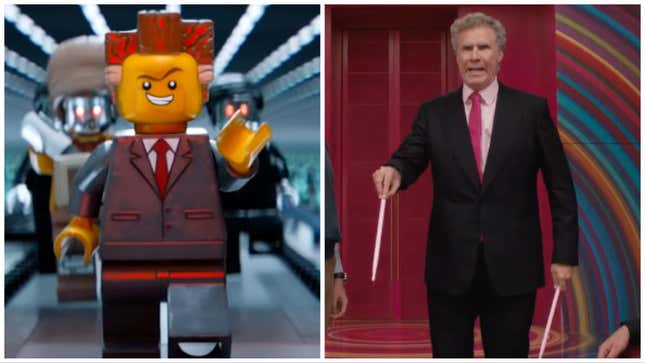Caution: The ensuing piece examines the storyline of the movie Barbie. Buddy The Elf has grown into a mature individual. Having emerged in the boisterous era of the early 2000s, Will Ferrell embodied the embodiment of male immaturity, with his wide-eyed innocence and complete disregard for boundaries. From his roles as Buddy and Burgundy to his numerous cameos on Eastbound & Down and The Office, Ferrell personified male entitlement, effortlessly climbing the ranks of any organization despite his lack of restraint or composure. In 2014’s The Lego Movie, Ferrell portrayed Lord Business, showcasing both the petulant tyrant and the grown man overwhelmed by an uncontrollable world. In Barbie, Ferrell once again delves into this territory, leaving behind the playful atmosphere. The parallels between Barbie and The Lego Movie have not gone unnoticed. Barbie director Greta Gerwig and Lego filmmakers Phil Lord and Chris Miller skillfully navigate the challenge of adapting toys without established stories and exploring their significance in popular culture. However, it is hard to ignore the fact that, in both movies, Will Ferrell assumes the role of a villainous character who seeks to exert control and return Barbie to her confining circumstances, as depicted in Greta Gerwig’s film.
Ferrell established himself as the reigning king of man-children in the early 2000s. His portrayal of a boisterous fool across a string of successful movies showcased different levels of obliviousness. Through his characters Buddy from Elf and Brennan from Step Brothers, Ferrell essentially embodied the same role with slight variations. In Elf, his innocent enthusiasm for the holiday season creates an atmosphere of Christmas cheer, whereas in Step Brothers, that same sincerity becomes every parent’s worst nightmare.
The Lego Movie challenges this foundational element of Ferrell’s comedy by casting him as the embodiment of adulthood. His dual role as Lord Business and the father who glues his Legos together to prevent his son from playing with them forms the central threat and emotional core of the film. For much of the movie, Ferrell’s presence is only felt through his animated Lego character. However, when he is revealed as “The Voice Upstairs,” the movie effectively harnesses our familiarity with Ferrell as a beloved large adult son. This recognition strengthens the impact of the Lego Movie’s ending. In this context, Ferrell embodies Chazz Reinhold, the king of wedding crashers in the 2004 movie, who is believed to be eternally youthful but eventually resorts to gluing toys together as a desolate man a decade later.
Nearly a decade after The Lego Movie, Ferrell continues along the same trajectory in Barbie. Both Lego and Barbie share the blend of playfulness with elements of reality. When these boundaries are crossed, it falls to Ferrell to restore order. Lord Business achieves this by super gluing Legos, depriving players of the joy of creation. Similarly, the CEO of Mattel aims to confine Barbie back into her box, fearing any unusual behavior, such as her seeking medical attention. In Barbie, Ferrell’s character is not explicitly portrayed as a threat, but rather as an impediment akin to Ron Burgundy, another touchy and loud individual who stumbles into success unknowingly. While Greta Gerwig’s treatment of Ferrell’s character lacks overt hostility, it remains a clear example of his recurring portrayal as an immature adult, reflecting his worldview.
After a second act that bears resemblance to Elf, Barbie (portrayed by Margot Robbie) returns to Barbie Land only to find her home transformed into a Will Ferrell joke by Ken (played by Ryan Gosling). Ken’s “Mojo Dojo Casa House” resembles a series of improvised non-sequiturs reminiscent of Burgundy. It’s oddly fitting that Ferrell would helm a company producing dolls that resemble characters he has portrayed.
A strong comedic persona evolves with its performer. Bill Murray serves as a prime example of this phenomenon. As Murray aged, his sarcastic slacker persona morphed into that of a lonely curmudgeon, left behind by the world he once rejected. Will Ferrell is undergoing a similar transition. We witness his journey from an overgrown man-child in Elf to a hapless stepfather in Daddy’s Home. Like any exceptional movie star performance, Ferrell’s casting brings with it the baggage of his previous roles, which serves to enhance the movie’s appeal. Just as there is a hint of Lord Business in the CEO of Mattel, elements of Buddy The Elf can be found in the trailer for Ferrell’s upcoming film Strays, where he finds himself out of his element with talking dogs. Ferrell seamlessly incorporates these facets of his previous characters into his performances as the antagonist, allowing the audience to easily connect with him without requiring much explanation.
In conclusion, Will Ferrell’s portrayal as a villainous character in Barbie continues his exploration of the immature adult archetype. Through his roles as Lord Business in The Lego Movie and the CEO of Mattel in Barbie, Ferrell manages to bring depth and complexity to these comedic antagonists. His history as a beloved comedic figure adds an extra layer of engagement for the audience, thereby contributing to the success of these movies.
